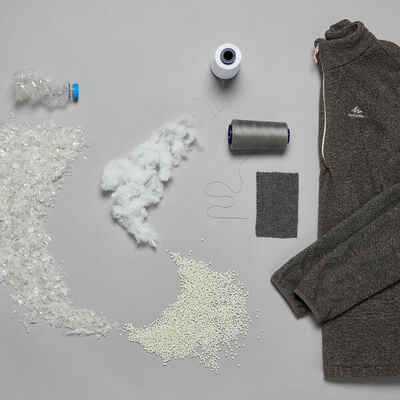These waterproof and warm shoes will provide you with very good hold for snowshoeing. The snowcontact sole
We have selected warm and insulating materials for this shoe, providing good protection against snow and cold. We have tested it in the laboratory and in the field with our user representatives. We checked the temperature up to which it stays comfortable when you're stationary and when you're walking, as this varies a lot: -12°c in static mode and -21°C on the move. We also took into account how temperature is felt differently by men and women.
How do your boots protect you from outdoor conditions?
Your shoes have been designed with a membrane to ensure optimal water-resistance. A membrane is a very fine component (between 5 and 25 micrometres) affixed to the inside of a fabric that will prevent water from entering while letting moisture escape. While you stay warm in your shoes, your feet will also stay dry. The sole insulates from the cold coming from contact with snow.
Breathable boots for optimal thermal comfort
Thermal comfort is a balance between the warmth of the boots and its ability to let the foot breathe. Too much heat or not enough breathability means that damp accumulates and cold can set in. We have designed your shoes with your regular and at times intense activity in mind, with a membrane which prevents water ingress and lets damp out.
How can I be sure that my boots are 100% waterproof?
We made sure that your shoes are waterproof by conducting laboratory tests to simulate walking with the boots half submerged in water. We also conducted field tests to measure wear and ageing.
What is the difference between traction and grip?
The traction of the boots depends on the number and shape of the studs. The grip is dependent on the materials of the sole and the tread pattern, like the tyres of your car. Traction optimises propulsion, prevents the boot from slipping backwards when going uphill and stabilises the boot.
Grip prevents the boot from slipping and skidding on smooth ground or in demanding conditions (rain, snow, ice) by giving the sole grip.
How does the SNOWCONTACT technology used on the boot sole help me?
The SNOWCONTACT soles are designed using a specific component and stud pattern (5 mm) to provide the best possible grip and traction. SNOWCONTACT soles are more effective than traditional soles on snow. When walking on ice, the only way to ensure optimum safety is to add anti-slip grips to your boots.
Why is it important to be well supported in a hiking shoe?
The support provided by your shoe is essential for your comfort when walking. Indeed, good support optimises your steps on hilly terrain (ascent and descent), prevents your foot from sliding in the shoe and reduces the occurrence of blisters. There is less loss in the transmission of your energy to the shoe and therefore less fatigue. This is especially important when you are snowshoeing.
Are your shoes suitable for snowshoeing?
We designed these shoes for hiking on snow, with or without snowshoes. The upper of the shoe (mid-height type) combined with gaiters (external or integrated in the trousers), provides good protection against snow getting in. Waterproof and warm, their support and rigidity are more suitable for walking with snowshoes.
Will your boots withstand regular use over the long-term?
Our engineers conduct laboratory tests to ensure that the product fully complies with your satisfaction in use. Our verifications include the following elements: tearing eyelets and straps, gluing, toxicology, UV resistance, abrasion resistance of outsole and upper components, accelerated ageing.
How do I choose the right footwear for snow hiking?
To be well equipped in winter, we recommend that you follow these guidelines :
Warmth: warmth provided by a warm pair of socks (ideally containing a suitable percentage of wool)
Breathability: Choose the sock according to the intensity of the hike and make sure you wear a breathable model to minimise moisture.
Boot height: adapt the height of the sock to the height of the upper and preferably choose high models if you want more protection.
How should you preserve the technical qualities of your shoes?
A fabric's water repellent property is its capacity to make water run off its surface without seeping in. As a result, the fabric does not soak up water & stays light, breathable & warm. The water repellent property is achieved by treating the fabric's exterior. This treatment needs to be renewed during the lifetime of the shoe. Products (spray or liquid) for this purpose are available in our stores.
How to dry the inside of your shoe.
Shoes can become heavy while they’re being worn in the wet (condensation and perspiration)
If your boots are very wet, we advise you to remove the insole, fill the upper with balls of newspaper and change them regularly. The paper will pump out moisture and speed up drying.
Never put the shoes too close to a heat source, but leave them in a warm, dry and ventilated place.
It is the ideal outfit for your hikes in cold weather.
We designed these shoes as one of the elements of the perfect set for your cold-weather hikes: the SH500 outfit. Equipped with your trousers, your SH500 fleece, SH520 shoes and your SH500 snowshoes, you will be able to enjoy your snow excursions whatever the weather, or almost. In any case, there's no need to wait for ideal conditions or to take everything with you in your rucksack, but you can travel light and well-equipped!
 Material
Material Process
Process Material
Material Material
Material Material
Material